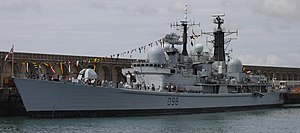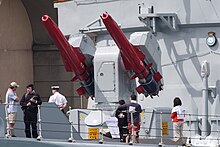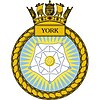| Revision as of 12:16, 21 April 2016 editAnomieBOT (talk | contribs)Bots6,571,976 editsm Dating maintenance tags: {{Citation needed}}← Previous edit | Revision as of 14:59, 22 July 2016 edit undo185.58.166.44 (talk) →Operational historyNext edit → | ||
| Line 79: | Line 79: | ||
| ==Operational history== | ==Operational history== | ||
| In the summer of 1990, HMS ''York'' was serving on a routine patrol in the ] as part of The ] which had been undertaken by a series of Royal Navy warships over many years. On 2 August that year, ]'s forces ]. Instead of heading off to the ] and Australia for series of "waving the flag" port visits, she remained on patrol in the Persian Gulf for an extra three months. This period was conducted when at sea mostly on a war-ready footing, involving virtually everyone onboard working Defence Watches (basically |
In the summer of 1990, HMS ''York'' was serving on a routine patrol in the ] as part of The ] which had been undertaken by a series of Royal Navy warships over many years. On 2 August that year, ]'s forces ]. Instead of heading off to the ] and Australia for series of "waving the flag" port visits, she remained on patrol in the Persian Gulf for an extra three months. This period was conducted when at sea mostly on a war-ready footing, involving virtually everyone onboard working Defence Watches (basically six hours on, six off) round the clock.{{citation needed|date=April 2016}} | ||
| In 2001, she tested a ]<ref></ref> | In 2001, she tested a ]<ref></ref> | ||
Revision as of 14:59, 22 July 2016
For other ships with the same name, see HMS York.
 HMS York in Jersey on 4 May 2009. HMS York in Jersey on 4 May 2009.
| |
| History | |
|---|---|
| Name | HMS York |
| Builder | Swan Hunter, Tyne and Wear, United Kingdom |
| Laid down | 18 January 1980 |
| Launched | 20 June 1982 |
| Sponsored by | Lady Gosling |
| Christened | 9 August 1985 |
| Commissioned | 9 August 1985 |
| Decommissioned | 27 September 2012 |
| Identification |
|
| Motto | Bon Espoir ("Good Hope") |
| Status | Scrapped in Turkey 2015 |
| Badge | |
| General characteristics | |
| Class and type | Type 42 destroyer |
| Displacement | 5,200 tonnes |
| Length | 141 m (463 ft) |
| Beam | 15.2 m (50 ft) |
| Propulsion |
|
| Speed | 34 knots (63 km/h; 39 mph) |
| Complement | 287 |
| Armament |
|
| Aircraft carried |
|
HMS York was a Batch III Type 42 destroyer of the Royal Navy. Launched on 20 June 1982 at Wallsend, Tyne and Wear and sponsored by Lady Gosling, York was the last Type 42 built. The ship's crest was the White Rose of York, and the "red cross with lions passant" funnel badge was derived from the coat of arms of the City of York. With a maximum speed of 34 knots (63 km/h; 39 mph), she was the Royal Navy's fastest destroyer.
Operational history
In the summer of 1990, HMS York was serving on a routine patrol in the Persian Gulf as part of The Armilla Patrol which had been undertaken by a series of Royal Navy warships over many years. On 2 August that year, Saddam Hussein's forces invaded Kuwait. Instead of heading off to the Far East and Australia for series of "waving the flag" port visits, she remained on patrol in the Persian Gulf for an extra three months. This period was conducted when at sea mostly on a war-ready footing, involving virtually everyone onboard working Defence Watches (basically six hours on, six off) round the clock.
In 2001, she tested a RIM-116 Rolling Airframe Missile
In 2003, York took part in the invasion of Iraq providing air cover and area protection for the aircraft carrier HMS Ark Royal. In 2004, she was fitted with the MOD 1 variant of the mark 8 4.5-inch gun. She and Edinburgh were the only two Type 42s to be so fitted.
In July 2006, York joined Gloucester in evacuating British citizens from Beirut in the 2006 Israel-Lebanon conflict making several trips in and out of Lebanon, ferrying evacuees to Cyprus.
In February 2010, York and the auxiliary Wave Ruler were deployed to the Falkland Islands coinciding with a period of increased tensions between the United Kingdom and Argentina over the former's plans to begin drilling for oil in the seas surrounding the islands.
In February 2011, York was deployed to Malta to assist in the evacuation of British nationals from Libya. On 21 April 2011, York arrived at the East Cove Military Port in the Falkland Islands, beginning patrol duties for the islands. On 12 December 2011, York spotted the Admiral Kuznetsov with its carrier group northeast of Orkney, off the coast of northern Scotland, and shadowed the carrier for a week. This was the first time Admiral Kuznetsov had deployed near UK waters and the closest in 20 years that a Russian naval task group had deployed to the UK. She then sailed around the top of Scotland and into the Atlantic past western Ireland, where she conducted flying operations with her Sukhoi Su-33 Flanker jets and Kamov Ka-27 helicopters in international airspace.

On 13 April 2012, Edinburgh fired the last ever operational Sea Dart missiles after a thirty year career. As such York completed her career without the system being operational.
York entered Portsmouth harbour for the final time on 20 September 2012, and was decommissioned on 27 September 2012. In August 2012, the ship was put up for sale.
Affiliations
References
- ^ "Royal Navy's HMS York makes final Portsmouth return". BBC News. 20 September 2012. Retrieved 17 June 2015.
- "Royal Navy Bridge Card, February 2009" (PDF). Retrieved 20 June 2009.
- ^ "Title unknown". Archived from the original on 29 April 2011.
{{cite web}}: Unknown parameter|deadurl=ignored (|url-status=suggested) (help) - "HMS York History". Archived from the original on 9 September 2010. Retrieved 17 June 2015.
- "Lebanon Britons speak of relief". BBC News. 19 July 2006. Retrieved 17 June 2015.
- "Gordon Brown says UK is prepared in Falkland Islands". BBC News. 18 February 2010. Retrieved 17 June 2015.
- Chulov, Martin (24 February 2011). "Libya rebels isolate Gaddafi, seizing cities and oilfields". The Guardian. London. Retrieved 17 June 2015.
- ^ "British warship escorts Russian aircraft carrier past UK waters". The Daily Telegraph. London. 7 February 2012. Retrieved 17 June 2015.
- "York completes a week shadowing Russia's biggest warship around the British Isles" (Press release). Royal Navy. 22 December 2011. Archived from the original on 23 April 2012. Retrieved 20 May 2012.
{{cite press release}}: Unknown parameter|deadurl=ignored (|url-status=suggested) (help) - "HMS Edinburgh Fires Final Sea Dart Missiles". Archived from the original on 14 May 2012. Retrieved 20 May 2012.
{{cite web}}: Unknown parameter|deadurl=ignored (|url-status=suggested) (help) - "A last hurrah for Sea Dart as the missile roars off Scotland". Navy News. Royal Navy. 20 April 2012. Retrieved 17 June 2015.
- "HMS York and HMS Edinburgh for sale on Navy website". BBC News. 8 August 2012. Retrieved 17 June 2015.
External links
- Royal Navy Website: HMS York (D98)
- Navy News – Ships of the Royal Navy – HMS York
- YouTube Video of HMS York at full speed
| Type 42 destroyers | |
|---|---|
Hércules class | |
| |
Categories:
